GoPro Hero 8 Black targets vloggers with add-on modules
- Published
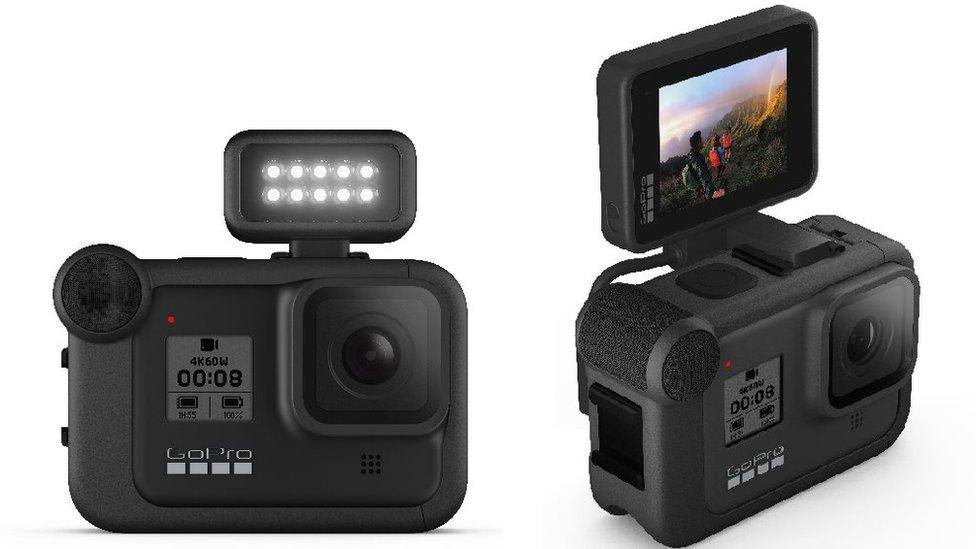
The Hero 8 Black can be easily connected to add-on kit known as Mods
GoPro's new flagship action camera is designed to connect to a new range of hardware add-ons targeted at vloggers.
But experts suggest that other improvements are relatively minor, meaning the Hero 8 Black may be a tough sell.
GoPro remains the bestselling action cam brand in much of the world.
But the firm posted a loss in its last two quarters and is facing competition from China's DJI, which entered the market with a rival product in May.
Last year's GoPro launch - the Hero 7 Black - delivered a vast improvement to in-body stabilisation, leading its chief executive to claim it was a "gimbal killer "- a reference to the fact it did not require add-on equipment to produce smooth footage.
Reviewers recognised this to be a significant upgrade, and the company reported the model had achieved its strongest-ever first month sales to date, external.
But over the past 12 months as a whole, the firm's cash reserves have still shrunk from $114.8m (£93.3m) to $91.2m, and its shares have dropped about 30%. One analyst warned it could face further problems if consumers do not consider the latest features to be a compelling enough leap forward.
"If retailers were unable to work through their existing inventory prior to GoPro's new product launch, its new product launch may be cannibalised by a substantially discounted Hero 7 Black at holiday," Alicia Reese from Wedbush Securities told the BBC.
"GoPro must continually launch products compelling enough for users to want to buy a GoPro in addition to a smartphone.
"[But in its favour], GoPro has greater mind-share when it comes to action cameras than other brands, and the company has a growing presence in the travel space."
Add-on Mods
The Hero 8 Black's standout feature is that users can now bolt on three optional accessories. They are:
a shotgun microphone for improved audio
a small light to help in dim conditions
a flip-up screen, allowing self-shooters to frame themselves
The camera body has also been redesigned to incorporate fold-out "finger" connectors - allowing it to be bolted to a mount without having to first be put in a case.
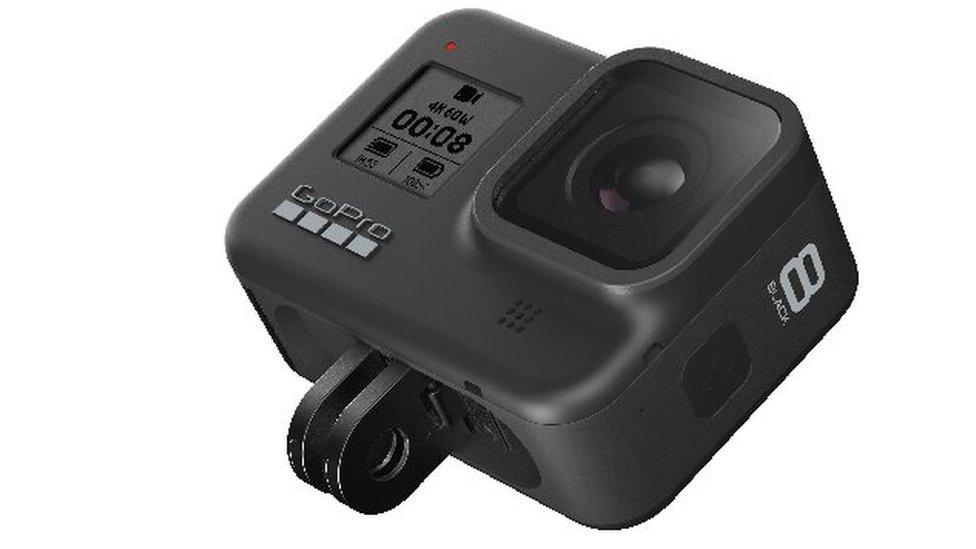
The camera include built-in mount connectors that are magnetic, so they stay folded away when not in use
In addition, the firm says it has further improved in-body video stabilisation, which is now available for all video frame rates and resolutions. And it has added a new feature to its Timewarp mode - which creates smooth sped-up footage - to automatically adjust the footage's speed dependant on the rate of the camera's motion and the lighting conditions.
Furthermore, users can shoot video at up to 100 megabits per second - up from 78 Mb/s previously - which should deliver higher-quality images.
One of the problems the firm faces, however, is that smartphones are making significant strides forward of their own, including multiple lenses, the ability to blur the backgrounds of photos and sometimes videos, and the use of machine learning algorithms that vastly improve low-light shots.
"In terms of quality, it's now difficult for action cams to offer anything that a smartphone can't do," commented Mark Wilson from the Trusted Reviews news site.
"And smartphones have gained waterproofing, which has helped encourage people to use them in situations that they might have previously have turned to a GoPro.
"Some people will still want a camera for situations they don't want to risk damaging their phone.
"But it feels a bit like GoPro has reached the limitations of the hardware it has created, and has now moved on to accessories as the motivation to convince people to buy another one. Whether that's enough remains to be seen."
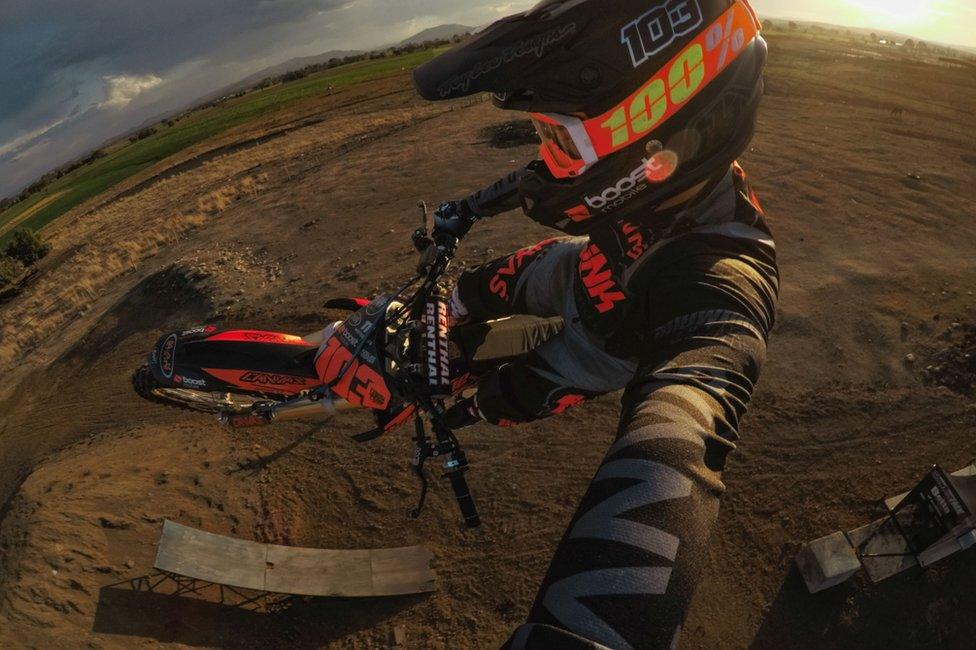
Some consumers may be unwilling to risk a smartphone to video action sports
The new flagship camera costs £380 and the Mods accessories range from £50 to £80.
YouTube vloggers
The new camera will be marketed in part to social media creators.
However, in doing this, the firm will compete against not just against DJI's Osmo Action camera - which features a selfie screen on its front - but also a variety of new "mirrorless" cameras with interchangeable lenses, which are targeting the same market.
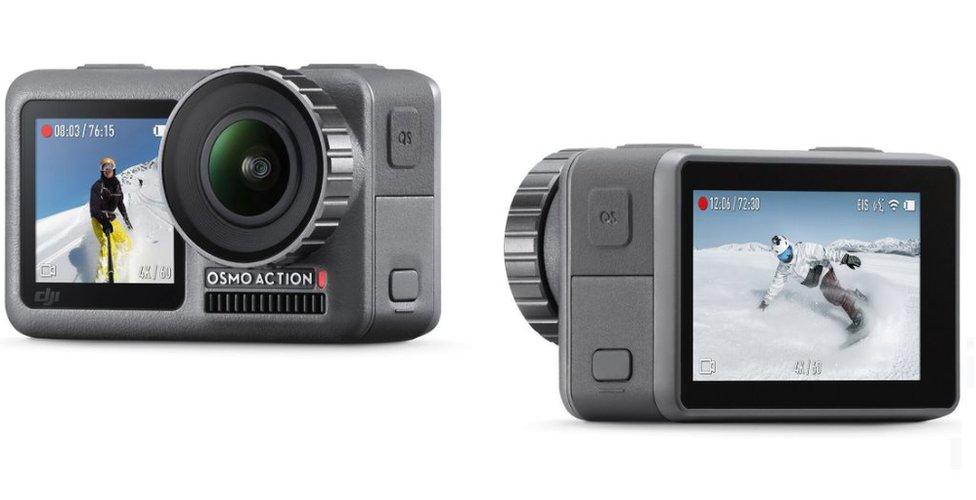
DJI's rival Osmo Action has a screen on both its front and rear
"YouTube has been massive driver for GoPro sales, and there's a degree of one-upmanship on the platform where users need to create something ever more more spectacular to stand out," commented Mr Wilson.
"So that will help, but action cams are still a niche part of the vlogging market."
GoPro has also announced a new dual-lensed 360-degree camera called the Max, which marks an upgrade to its earlier Fusion.
The firm says the new model has a wider field-of-view and should be easier to operate than before.
Such cameras have the ability to create interactive footage for use in virtual reality or that can be played back in software that allows viewers to shift perspective.
But they also allow owners to create standard videos, in which they can make adjustments to the view during their edit.
Demand for such products has been more limited than some had forecast, in part because VR headset sales have also been weaker than expected.
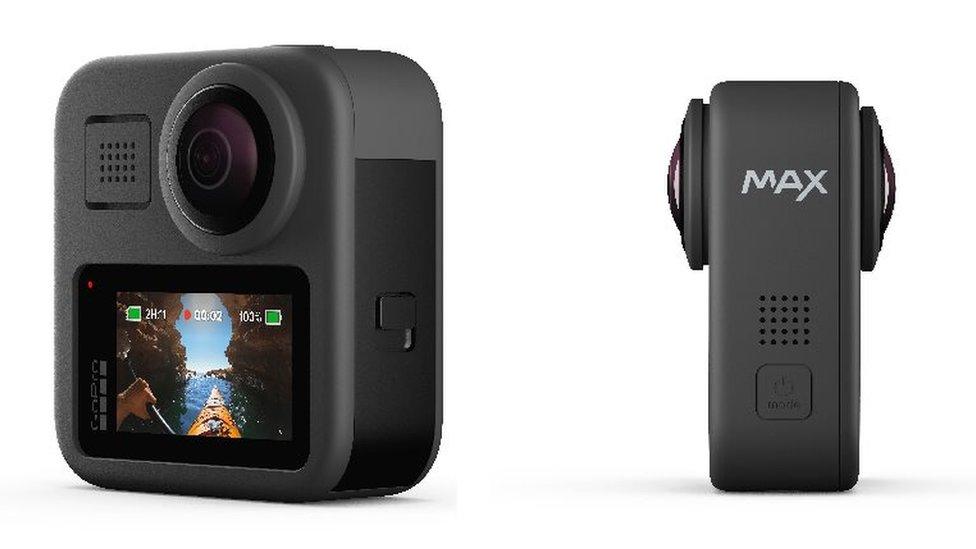
The GoPro Max features a camera on both sides of its body
But Ms Reese said there should still be demand for the GoPro Max from a group of professional and enthusiast film-makers.
"I don't think these were ever expected to be mainstream products [and they] were never mass-produced," she commented.
But she added that there was an "expectation that the new camera will be well-received by this niche market".
- Published15 May 2019
